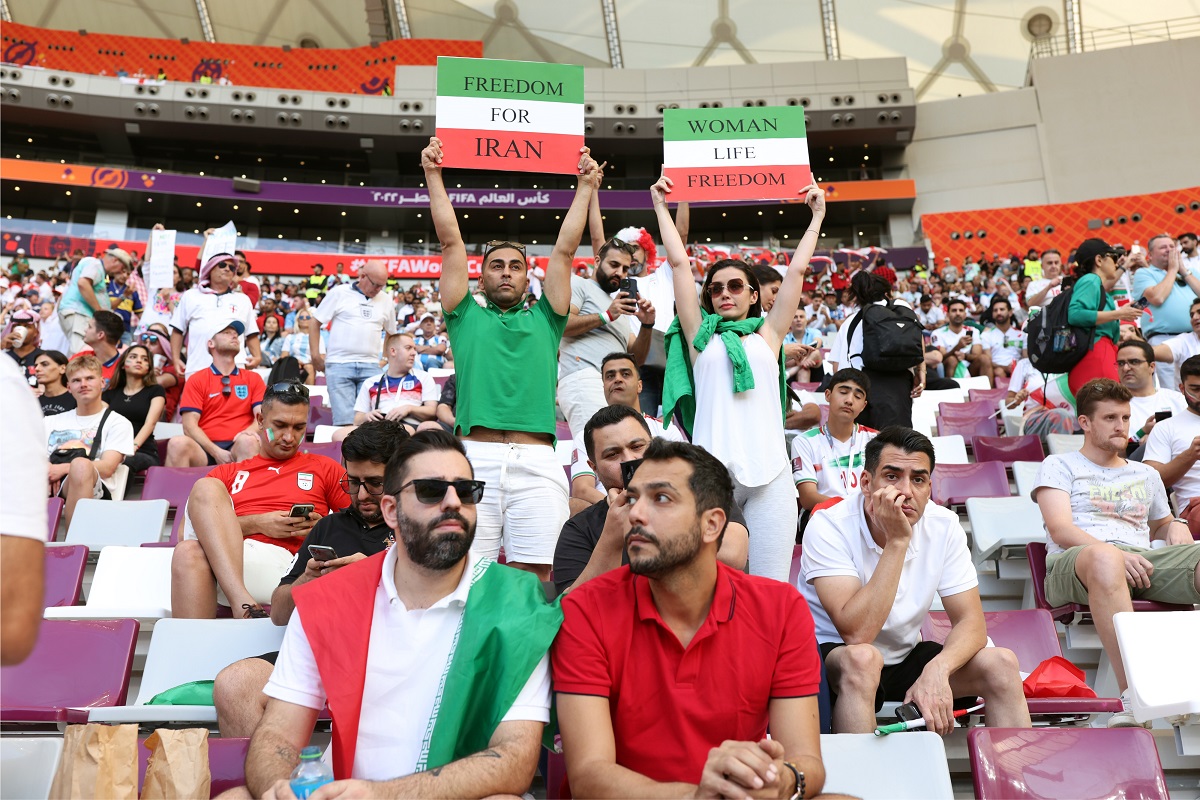November 21
Sports: Members of Iran’s national soccer team remained silent during their national anthem before their match against England’s team at the World Cup in Qatar. The move was widely interpreted as an act of solidarity with protestors in Iran. Team captain Ehsan Hajsafi had offered condolences to “all the bereaved families of Iran” in a press conference the previous day. “We are here but it does not mean that we should not be their voice, or we must not respect them,” he said.
Sports: Carlos Queiroz, the coach of Iran’s national soccer team, expressed frustration because Iranians were harassing players for not taking a stronger stance in support of the protests. “To those who come to disturb the team with the issues that are not only about the football opinions, they’re not welcome because our boys, they’re just simple football boys,” he told reporters after the team lost 6-2 to England. “Let the kids play the game. Because this is what they’re looking for. They wanted to represent the country, to represent the people, as any other national team that are here. And all the national teams, there are issues at home.”

Domestic: Security forces reportedly fired heavy machine guns at protestors in the Kurdish town of Javanrud in the west. At least five people were killed, according to human rights groups. A demonstration had broken out at the funeral for two people who were killed the previous day.
Regional: Major-General Aharon Haliva, the head of Israeli military intelligence, said that Iran’s protests were morphing into a popular uprising. “When you look at some of the incidents, even the hours at which they are taking place, the damage to national institutions, to symbols of the state, at the number of fatalities, there is something different happening here that is greatly troubling the regime,” he told Tel Aviv University's Institute for National Security Studies. But the demonstrations did not pose a “real danger to the regime.”
Regional: The Revolutionary Guards launched missile and drone strikes against two Iranian Kurdish opposition groups – Komala and the Democratic Party of Iranian Kurdistan – based in northern Iraq. Some 26 members of the groups were killed, according to Tasnim News Agency, a hard-line Iranian outlet.
International: U.S. National Security Advisor Jake Sullivan met with Lieutenant General Aviv Kohavi, the chief of the general staff of the Israel Defense Forces, to discuss shared concerns in the Middle East. “They emphasized their shared determination to address security challenges impacting the Middle East, including the threats posed by Iran and its proxies, and Mr. Sullivan affirmed the President’s commitment to ensuring that Iran never acquires a nuclear weapon,” according to National Security Council Spokesperson Adrienne Watson.
November 22
Sports: Hard-line newspaper Kayhan blamed Iran’s loss to England at the Word Cup on Western powers and regional rivals. “Iran - 2; England, Israel, Saudi and traitors – 6,” headlined Kayhan. The daily alleged that weeks of “psychological warfare” from “domestic and foreign-based traitors” had taken a toll on Iran’s players.
Regional: The Revolutionary Guards launched missiles and suicide drones on Iranian Kurdish opposition groups in northern Iraq for the second consecutive day. The Kurdistan Regional Government (KRG) said that positions in Perdi, north of Kirkuk, and the Degala region, east of Erbil, were hit. The headquarters of the Kurdistan Freedom Party (PAK) was among the targets. “We had taken our precautions and emptied the premises, there were no casualties,” said Khalil Nadr, a PAK spokesman.
In a statement, State Department Spokesperson Ned Price condemned Iran’s “brazen violations of Iraq’s territorial integrity” and urged Tehran to cease the attacks.
Human Rights: U.N. High Commissioner for Human Rights Volker Turk said that the situation in Iran was “critical” due to the harsh government crackdown on protestors. “The rising number of deaths from protests in Iran, including those of two children at the weekend, and the hardening of the response by security forces, underline the critical situation in the country,” said a spokesperson.
Domestic: Judiciary spokesperson Masoud Setayeshi announced that 40 foreign nationals had been arrested for participating in anti-government protests. The judiciary did not divulge the names of foreigners that were detained.
Nuclear: Iran announced that it had started enriching uranium to 60 percent purity – a technical step away from 90 percent purity, or weapons-grade – at Fordow, an underground nuclear facility. “We had said that Iran will seriously react to any resolution and political pressure,” nuclear chief Mohammad Eslami said. Iranian media reported that advanced IR-6 centrifuges were being used. The move came in response to a resolution passed by the U.N. nuclear watchdog’s Board of Governors on November 17. The resolution rebuked Iran for not cooperating with an investigation into traces of uranium at three undeclared sites.
November 23
Regional: The Revolutionary Guards aerospace division blamed Israel for the killing of one of its officers in a roadside bombing near Damascus. Israel will pay for the "crime," Colonel Davoud Jafari vowed. Iran provided critical military support to the Assad regime since the Syrian civil war broke out in 2011.
